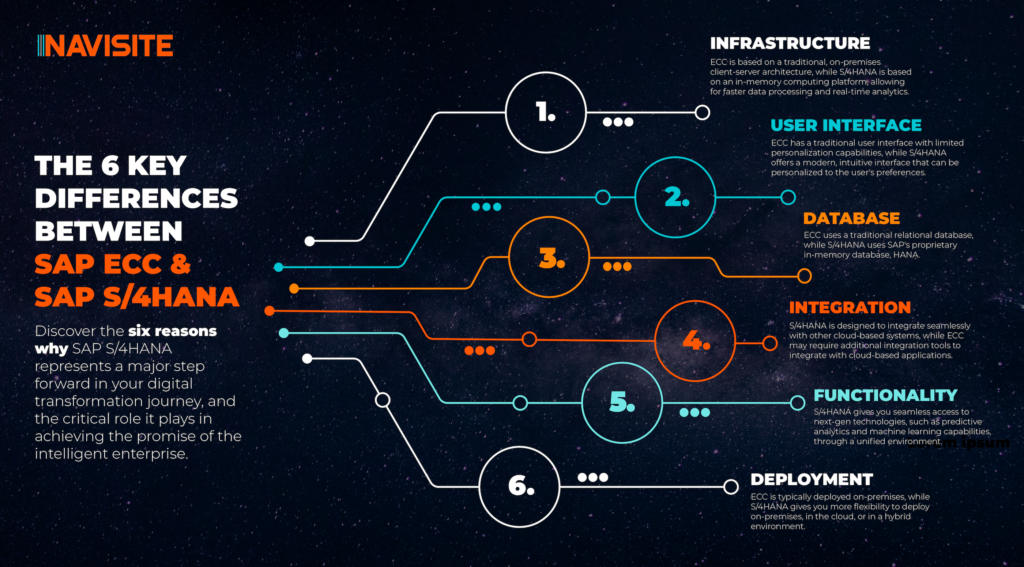Understanding the Difference Between SAP ECC and SAP S/4HANA
By now, it’s well known that moving to a modern ERP is one of the most important decisions in your digital transformation journey.
This decision is especially top-of-mind for businesses currently running on SAP ECC 6 software. Since the introduction of SAP S/4HANA—SAP’s modern ERP system—in 2015, SAP customers have known that they will eventually need to move off of SAP ECC and adopt SAP’s powerful next-generation ERP software, S/4HANA. Now, with the 2027 end-of-support deadline in sight, many find themselves at a critical crossroads.
Today, more than one-third of SAP customers say that the end of maintenance support for their core ERP system is the main driver for considering S/4HANA. And the question for many now is not if you should make the move to S/4HANA, but instead: when and how are you going to get on the road, and what will the final destination look like?
Answering these questions starts with better understanding the foundation and features of SAP’s core products, which can help businesses know what to expect along their journey. As a leading provider of end-to-end SAP services, we often receive many questions around the differences between SAP’s ERP solutions, and which would best suit an organization. And as ECC users consider their options for the future, understanding how their current SAP ERP system compares to S/4HANA is critical.
In this blog post, we dive into the key differences between SAP ECC vs. S/4HANA—and the shift they represent as businesses look to achieve the promise of SAP’s intelligent enterprise.
Moving Toward the Intelligent Enterprise
The first step in understanding the difference between S/4HANA and ECC is learning about SAP’s intelligent enterprise framework—an all-encompassing shift in the organization’s processes toward a digital-first, modernized future.
Becoming an intelligent enterprise means different things to different companies. For some, it may mean delivering a superior customer experience. For others, it means connecting its people, systems, and data under one powerful and modern system. And for others still, it may mean automating and enhancing core business processes, adopting next-gen technologies or bringing analytics at the forefront of decision-making.
No matter what your goals are, they’re all unified by a common core: to successfully embrace this digital transformation, companies need to expand their capabilities and technology by tapping into the undeniable opportunities that S/4HANA can offer.

What is SAP ECC?
To better understand the role S/4HANA plays in digital transformation, it’s important to dig into where many organizations are starting—and that’s ECC.
SAP ECC (also known as SAP ERP) is SAP’s legacy suite of enterprise applications and was designed to run on a third-party database. ECC is also the core business product inside SAP Business Suite, and it provides an integrated and updated overview of an organization’s business processes—from financials and warehousing to human resources and logistics. To better understand just how far-reaching ECC’s impact on a business is, some of the commonly used modules include:
- Financial Accounting and Controlling (often referred to as FICO)
- Sales and Distribution / Customer Service
- Materials Management
- Production Planning
- Quality Management
- Warehousing
- Logistics
- Plant Maintenance
- Human Resources Management
SAP Business Suite adds more capabilities with advanced modules that integrate with that core, such as Customer Relationship Management (CRM), Supplier Relationship Management (SRM), Supply Chain Management (SCM) and Product Lifestyle Management (PLM).
What is SAP S/4HANA?
SAP S/4HANA is a next-generation ERP software designed to provide real-time analytics, a streamlined user interface, and a simplified data model to help businesses run more efficiently and effectively.
S/4HANA is built on the advanced SAP HANA in-memory database platform, which allows it to process large amounts of data quickly and efficiently. This enables businesses to make more informed decisions based on real-time insights—it’s also one of the most important differences when compared to SAP ECC, which, as mentioned earlier, runs on a third-party database.
S/4HANA also offers a personalized user experience with SAP Fiori and delivers the faster response times and performance needed to engage everyone in your ecosystem—employees, customers, and partners.
Another significant advantage of S/4HANA is the end-to-end and seamless integration of key business components—like financial management, procurement and supply chain management, sales and distribution, production planning and control, and project management. It also serves as a critical backbone for business operations that want to tap into the power of next-gen technologies like robotic process automation, machine learning, big data management, IoT, AI, and much more.
Overall, S/4HANA is the digital core enabling SAP’s intelligent enterprise model—helping businesses improve productivity, reduce costs, and increase their agility in a rapidly changing market.
What’s the Difference Between SAP ECC and S/4HANA?
You already know that S/4HANA is the next generation of SAP ERP software while, SAP ECC is the legacy solution. But when putting these two solutions side-by-side, how do they compare? And what do these differences mean for your business?
Here are some of the core differences between SAP ECC and S/4HANA:
- Functionality: ECC is packaged with modules for financials, human resources, warehousing, and logistics—allowing streamlined management of all essential “inside the four walls” business processes. S/4HANA still provides these capabilities but also comes with several modern features to increase business efficiency and provide cloud extensibility. For example, it combines multiple data modules into a single table called the ACDOCA (the Universal Journal), which significantly reduces your data footprint by eliminating numerous aggregate and index tables. S/4HANA with the Business Technology Platform (BTP) also provides AI- and Machine Learning-powered features as well as more native embedded analytics for business operations—empowering companies to make data-driven decisions and predictions.
- Deployment: As mentioned earlier, ECC is designed to be deployed on-premises—but can still be moved to the cloud. In contrast, S/4HANA was designed to be cloud-first, and it can seamlessly be deployed across both on-premises and cloud systems. This gives you more flexibility to choose the deployment option that best fits your needs and future goals. Most importantly, customers moving to S/4HANA can take advantage of RISE with SAP, which is SAP’s cloud solution for S/4HANA delivered in a SaaS model. With SAP’s RISE offering, customers can move to the SAP Public Cloud or implement S/4HANA on their hyperscaler of choice in a private cloud (AWS, Azure, GCP). Another key part of RISE is that it comes as a bundled solution. Customers get access to BTP, Ariba, and other common components they need to connect with S/4HANA so they can develop a solution that meets their unique needs without significant additional investment. Once customers are on RISE, they can quickly start to integrate data across applications and functions in ways that were previously impossible—opening the door to the intelligent enterprise.
- Database: S/4HANA runs exclusively on the HANA database. While ECC can run on HANA, it typically runs on third-party databases. The shift to running only on SAP HANA Cloud database was intentional, enabling S/4HANA to move away from the limitations of traditional databases and embrace the benefits of SAP HANA Cloud’s in-memory database architecture, which enables S/4HANA to run much faster and more efficiently. For example, S/4HANA reads data directly from the RAM memory instead of the hard disk, allowing your business to process data faster.
- Customizability: While SAP ECC offers highly customizable options for your business needs, it also comes with increased complexity. In contrast, the more limited customizability of S/4HANA means a more simplified and intuitive user experience. And, with S/4HANA’s integration capabilities on the cloud, customers can create a highly-tailored solution leveraging next-gen technologies.
Click on the infographic below to learn more about the key differences between SAP ECC and S/4HANA—and what they mean for your business.

Start Your Move to S/4HANA
There’s no doubt that ECC can continue to help your business run today. But to help get your business to where it needs to go tomorrow, S/4HANA’s infrastructure offers powerful advantages that can future-proof your enterprise. SAP’s modern ERP has been specifically designed to serve as a company’s digital core, enabling seamless integration of data, systems, and business processes that benefit from the scale, agility, and flexibility of the cloud.
Now that you know the difference between SAP ECC and S/4HANA, learn more about how businesses are tapping into the power of S/4HANA to sharpen their competitive edge. Check out our recent S/4HANA case studies to see the real-world impact of SAP’s next-generation ERP solution.
If you’re ready to make the move from SAP ECC to S/4HANA and realize the promise of the intelligent enterprise, the Navisite, part of Accenture, team of SAP experts can help you start your journey. We’re a digital transformation leader and SAP Gold Partner with decades of experience. Whether you’re implementing SAP for the first time or need an upgrade to S/4HANA, our team of certified SAP experts will partner with you to assess, architect, implement and support the right S/4HANA solution for your business. We’ll serve as a trusted advisor every step of the way with technical and functional expertise, managed services and ongoing support.
